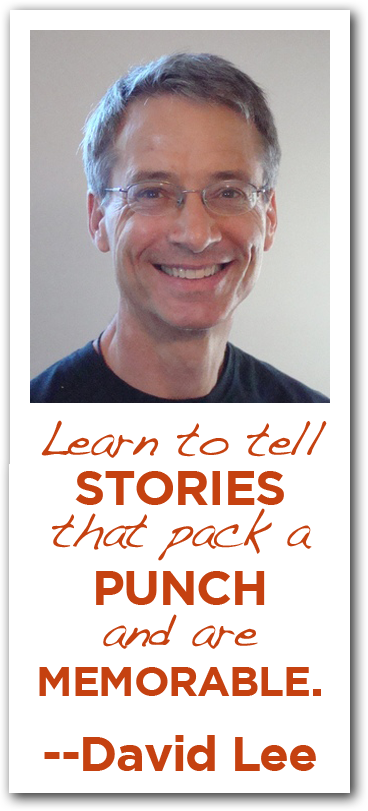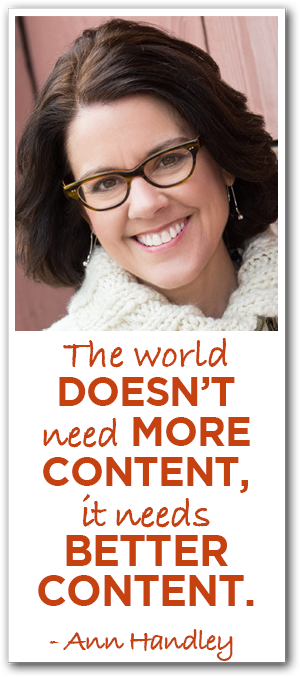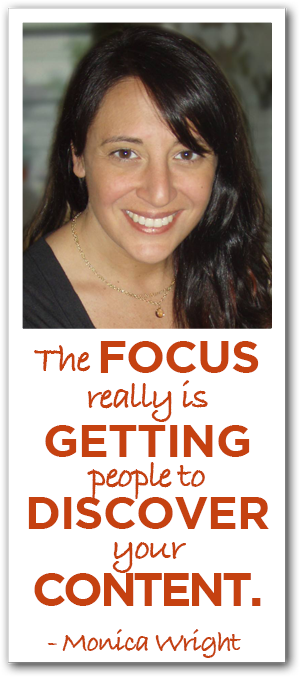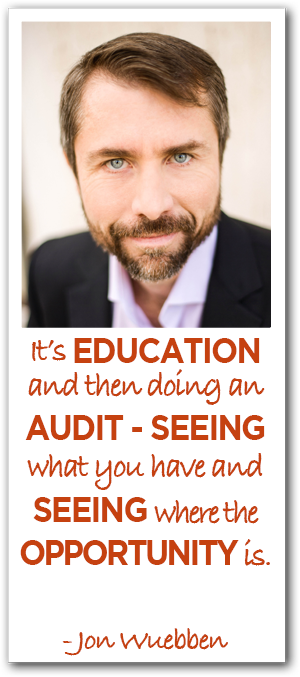 Have you been wondering how to create valuable content that’s going to generate more leads for your business? Successful content marketing is more than just creative SEO.
Have you been wondering how to create valuable content that’s going to generate more leads for your business? Successful content marketing is more than just creative SEO.
By researching who your potential profits are, you can better optimize creative keywords and phrases to tap into a broader audience. Learn about and utilize the four different types of content that you should be using to help build a successful marketing vehicle for your business.
Let Jon Wuebben, author of ‘Content Is Currency: Developing Powerful Content For Web and Mobile’, give you the “lay of the land” when it comes to content marketing for your business. Jon has personally helped hundreds of companies and digital agencies learn to plan, create, distribute and manage their content with phenomenal results.
Podcast: Play in new window | Download
Subscribe:
Big Ideas:
I’m really excited about this because I’m also a big fan of content, but you’ve been doing this content thing for quite sometime. How did you get started creating content?
- Yeah, you know, I was working for big companies, Rich, I was working for Ford Motor Company and Kia Motors America back in the day. And I just didn’t like working for the big, corporate entities. I was doing marketing for them, and quite frankly, I had a lot of ideas of how things should be run and I just kept hitting a brick wall.
- So I started a company thinking I could do this myself – that was back in 2003 – we started writing content for ad agencies here in California, writing ad copy and that kind of thing.
- Within 2 years we were on the SEO train and helping a lot of SEF firms with blogs and website pages and you name it, so that’s how I got into it.
Content marketing is a hot phrase in internet marketing circles. In fact, some might even say it’s jumped the shark. But for many small business owners, they’re just not hearing about it or they don’t see the value in it. I’ve heard before they wonder , “What does content marketing have to do with my landscaping business or my pizza parlor, it can’t help?”. What do you say when you come up against those objections?
- It’s surprising, it’s really surprising how many small businesses still have that mindset. And I think it’s something in the DNA the small business owner. You know, a lot of entrepreneurs sort of think they can do it all – one reason why a lot of them start a small business – and they sort of think they’re experts in everything. And I’m speaking from experience. I’ve been guilty of that myself.
- The bottom line is a lot of small business people don’t have a clue about marketing, but they think they do, and that’s a problem because they need to open their eyes to what’s going on in the world and some of these folks are a little old school in their mentality.
- They’re still thinking that the yellow pages work, they’re still thinking that direct mail works – it does sometimes, maybe for the pizza parlor down the street – but for most cases, it just doesn’t work anymore.
- And here’s the other thing, consumers have changed. Even the B2B audience has changed because we now have the power to choose who we want to do business with. We now can give reviews and testimonials and look on the internet and do research about the companies we do business with.
- And consumers now have so much more power than they had 10 or 15 years ago. And that idea is not embraced or appreciated by small businesses.
- So if that’s the dynamic, Rich, if that’s what’s going on, then we need to change our marketing in order to adjust to it.
Now, for the small business owners out there – and they’re just starting out with content marketing – maybe they’ve heard it and they’re like, “Yes, I get it, I get that we need to educate our customers.” How do you recommend starting, what’s the strategy behind beginning?
- I think first it’s just educating yourself.
- So if you’re a small business person, kind of educate yourself on what content marketing is, look at the best practices, see what companies out there that are similar to yours are doing it.
- And here’s the thing, I think most companies have competitors that are embracing inbound marketing or content marketing, maybe they just don’t know it.
- So look at your competitors and see what they’re doing on their websites and their blogs and see what kind of content they have over there. So I think educating yourself is first and foremost.
- Second, is doing an audit of all your digital properties.
- Look at your blog, if you don’t have a blog you might want to start there. Look at your website, look at the content you have that you’re offering for people to look at or for potential profits to look at and review and education themselves.
- And if you don’t have any content, then you know that you need to start from zero and then really start embracing it.
- I think it’s education and then doing that audit – seeing what you have and seeing where the opportunity is.
Alright, so we should be looking at our competitors and we should be looking at ourselves as well when it comes to deciding these sort of things.
- Educate yourself by going to the associations out there, they’re really directing the whole thing – which is Content Marketing Institute, or some of the other organizations out there that are doing some neat events in the space, because they have tons of educational articles and white papers and all kinds of stuff that you can look at to educate yourself on what content marketing is and how you can maximize it for your business.
Is there a way that a small business could determine what type of content is going to work for their business? Are their different styles of content that you recommend considering?
- Yeah, so there’s really 3 or 4 types of content.
- Number one is your “lead generation” content. So when someone comes to your website, a new visitor comes to your site, you want to ask yourself, “What would motivate them to download something, what motivates them as a consumer or a business owner?”.
- So ask yourself that question and come up with ideas on an ebook or a white paper or some kind of free download, some kind of free report that you can offer to prospects or visitors coming to your site for the first time. In exchange for that, you’re going to get their contact information – their email address, their first name at least, maybe a little bit more after that – so that’s the first kind of content, “lead generation” content.
- Second is the content that makes up your site pages, your landing pages. And that’s all the informational stuff about your products and services.
- You want to make sure that that’s benefits focused addressing pain points with your consumers and with your prospects – not so much about you and the features and functionality of your products and services – but addressing the benefits of pain points first.
- And then you want to look at your blog. The blog is really the hub of all your content activities, and that’s where you want to educate and inform and maybe do some interviews with industry folks or do some product reviews on products that you think your prospects would be interested in buying.
- You know, maybe other complimentary products to what you do. So, that’s all the main stuff.
- And then there’s all the off-site and off-blog content which is your social content – your tweets, your Facebook posts, your YouTube videos – all that kind of stuff.
- So that’s sort of the lay of the land when it comes to content.
So I just want to make sure that I wrap my head around it. Four types of content. The first is “lean gen” content. This is where we’re trying to motivate or persuade somebody to take an action that’s going to end up giving us their contact information. The second one is a kind of informational, benefits-based content that we’re going to put up on our site pages. The third one is going to be the education or informative content that we’ll probably put to our blogs. And then we’ve got fourth is the off-site content, which is really our social content and that’s putting the content in front of the people where they are to make their lives easier. And then hopefully have that content, they’d want to follow-up and check out more of our stuff by visiting our website or blog or something like that, correct?
- That’s it. That’s it right there.
Awesome. So, for these small businesses, should they create their own content? What’s been your experience, do they create it themselves, do they hire a copywriter? I understand, obviously, that you provide services for a lot of different companies, but what are some of the different ways people can do this?
- I think it’s 50/50. I think half the companies out there are doing it themselves and they have either writers on staff or they’ve actually told their employees that they have to blog or meet a mandate or found some folks and brought them into the organization.
- And let’s face it, if you’re a small business you really only need 1 or 2 people dedicated to that, you know, blogging for you and creating some of that lead gen content. But, they got to be good writers, they got to understand SEO, they have to understand content strategy, they have to understand social sharing.
- There’s a lot of things we’re asking of writers nowadays. Can they tell a story? Do they have sort of a journalistic approach to the writing? I mean, we’re asking a lot of the writers now because here’s the thing, with all the Google algorithm changes, quality content is first and foremost and there’s so much crap still out there on search engines.\
- Companies are paying the price for that. So if you’re hiring freelance writers that don’t know that stuff and can’t put a good sentence together and can’t really tell a story, then you’re going to do yourself a disservice.
- So that’s why companies like us exist, we can do all that for them, and quite frankly our business is growing and everybody else offering content services is growing too.
- So I would ask yourself, if you’re a small business, really ask yourself , “Is this something I want to outsource or not? Do I have the resources? Do I want to pay someone salary to come in here and write for me and can they write all the various topics and subjects that we need them to write? Or should I just outsource it and pay by the project and not have to pay a benefits package to a new employee?”
- Now there’s a lot of pros and cons, but it’s something you really want to take time considering what you want to do with that.
Now Jon, in my day job, flyte new media, I’m always pushing client’s to hire a copywriter or outsource it because I do see the value in it. One of the pushbacks, or actually there are 2 pushbacks that I get, and I’m wondering if you have a thought on this. One is, “I’ve worked with copywriters before and they’ll never understand my industry – fill in your industry – no matter how much they try.” And that’s one concern. And the other one is, “I’ve been told that my business has to have my voice, and so nobody can write in my voice except me.” You must run into that. What do you say when somebody says that to you?
- Yeah, well, that goes back to what I mentioned earlier which is the small business person sort of has this ego thing like they know everything and no one else can possibly understand my business except for me.
- That’s a big liability for a small business to have that kind of attitude and sort of ego thing is what I call it. Here’s the bottom line, there are writers out there that are good that can understand your industry and have written in your industry before.
- You just have to go out there and find them, or have someone find them for you. And as far as voice and capturing the tone and all that, any good writer can do that in their sleep.
- That’s the marching orders of a good writer is tell the story, and tell it in a tone and voice that is appropriate.
- So I just don’t buy that. I think there’s a lot of resistance out there to a lot of things. You’ll find those same small business people are also carrying that same attitude into the financial part of their business or the operational side of their business. And quite frankly, it’s just handicapping them.
- So, yeah, once in a while we come across a client where we just can’t quite capture the voice or we can’t quite write what they want. But you know what, usually because they can’t be pleased on any level and it’s more about them.
So, as we’re creating this content, obviously we don’t want to have a great content that nobody can find. What tactics do you have that we can use to get more people to find, read and possibly share our content?
- Well, it all kind of starts with the SEO piece. I mean, SEO is still really important and in order to be found on the search engines you do have to be using your keyword phrases in the content, you do have to do keyword research.
- I know for a lot of small business folks out there, that’s a new thing. You say “keyword research” they look at you with puzzled eyes, but there’s a lot of great tools out there, you know as well as I do that there’s keyword discovery and there’s word tracker and there’s – goodwill has some tools for that – and there’s many others.
- But you’ve got to find out what are people searching for when trying to find your business. You may know or think you know that those phrases are, you may come up with 20 or 30 of them, but i guarantee you there’s a good 30 or 40 or 50 other key words or phrases that people are using to try to find your business that you don’t know what those phrases are, so you have to do the research.
- And you have to talk to your customers and ask them, “Hey, how did you find our website?”. And they’ll tell you, a lot of them will tell you, “Yeah, I typed in blah, blah, blah on Google and that’s how I found you.”
- So really, doing the research, surveying your customers and your prospects about how they found you and optimizing your content, optimizing those pages, optimizing those blog posts for the long tail keywords, you have the short tail, all the one and two word keyword phrases, then you have the 4, 5 and 6 word keyword phrases, the long tail phrases that are really great for those blog posts.
- And because if you’re optimizing for the long tail keywords, then chances are the folks that are typing in those long tail keywords are really interested in buying, they’re serious about purchase intent.
- So if you capture those keywords, that’s going to be money in the bank for you. That’s sort of SEO from a content perspective in two minutes.
What kind of tactic can you share about creating content that gets people to act, whether it’s to book a room, to sign up for a cause or to visit our store?
- You have to really understand who the consumer is, who is the customer.
- So that’s where buyer personas come in. What’s a buyer persona? Well that’s a type of customer that you service. So you may service 3 or 4 types of people, types of businesses, and each of them have distinct qualities and characteristics that are unique to that group.
- So that’s a buyer persona. And you want to understand what motivates this person, what keeps them up at night, what are their pinpoints, really get inside their head. And when you can do that, then you can write to that audience, and you can capture that persona in that ebook or in that white paper, really addressing it to that specific type of buyer, that specific type of customer.
- And when you do that, you’re able to capture their interest – you might have a potential customer on your hands – because they’re going to read it, they’re going to go through it and they’re going to go, “Wow, this is awesome! This totally connects with me, I love how the company addresses me personally and I get it. These guys want to educate me first, they want to build a relationship with me first and I get that. I’m going to keep talking to them because they’ve just educated me and that other company I was taking to, they were trying to get my business right away, and I just don’t like doing that.”.
- So that’s kind of how it plays out.
So it’s about really understanding your clients and their pain points. I’ve heard you mention pain points or something similar to it a few times, so we really have to understand the pain points. And I agree with you that if our potential customers are happy and content, they’re not going to make a change in their buying habits anyways. So what we need to do is we need to uncover what it is that they’re unsatisfied with and blow it up, and if it’s big enough, then they’re going to be open towards making a change hopefully in our direction.
- Right. And then the other thing you can do, too, is look at competition and see what their value proposition is and can you do something cheaper or better or more efficiently.
- So there’s also that whole piece of it, too, and taking the competition head on and then ensuring that information with your prospect.
One of the things I’m sure that we’re all concerned about is, ok, we do this, we invest it, we spend the time, how do we know if this is working? How can we measure the performance of our content? Do you have any ideas around that?
- Yeah, so that’s a really hot topic right now, and I actually presented this topic at Content Marketing World last year, “content marketing measurement: the ROI of content”.
- The good news is there are more and more tools and technologies coming online everyday to help us do that.
- So first and foremost, you’ve got to understand what your goals are for the content and actually write those down.
- Are your goals about branding, are your goals centered around lead generation, are you trying to make a sale, what are your goals? And then put those into buckets, and then make sure that you have some kind of analytics tool that’s measuring all this.
- So Google Analytics is a great, free tool. A lot of companies use it. And they’re adding more and more features and functionality to it every month. So that’s a great tool.
- There are a lot of paid tools out there that are good, too. Woopra is one of them, there are plenty of others, but you’ve got to make sure that you’re looking at the analytics.
- So you set everything up on Google Analytics, you look at all the analytics on YouTube and Facebook and Twitter – which they all offer data that you can look through in terms of share and views and those types of metrics – and you’re setting up all these accounts and looking at the data and then try and tie it back to the content that they consume.
- And look at the breadcrumb trail. Most of your prospects are looking at 3, 4, 5, 6 or 7 things before they become a customer. So they may look at an ebook, they may then listen to a webinar recording a couple weeks later, then three weeks after that they may download some free guide on your site about the industry, and then they become a customer and they buy something.
- So you’ve got to know the breadcrumb trail for every customer and you can really get that data now. So that sort of gives everyone an overview, I think.
Yeah, that’s awesome. Thank you. Now I noticed from looking at your website that you talk about a bunch of different types of content, for lack of a better phrase, not the types we talked about earlier but maybe the format for those types. For example, case studies, ebooks, white papers – are there ones that work really well or ones that you find are effective in specific situations? And how do you decide what might be the right tool for you in a specific situation?
- Yeah, so we have to consider B2B versus B2C, right? Coming up with the types of content that are going to produce.
And I’m sure most people know this: B2B = Business to Business, B2C = Business to Consumer. Sorry to interrupt, I just wanted to make that point clear to some people.
- No, thanks for doing that.
- So with Business to Business, I’m sure a lot of folks listening to this that are B2B, you want to focus more on case studies and webinars and white papers and those types of things, because most companies when they are looking for a new product or new service or new vendor relationship, they’re looking at many different vendors.
- For us, we usually get 20 – 30 vendors before we decide on something. And what we’re doing is we’re going to their websites, we’re looking at their blogs, we’re downloading some of their content, we’re trying to understand who they are and what they do, reading their case studies, maybe listening to a webinar recording from that company.
- And those are the type of content that help B2B decision makers make that buying decision. So that’s B2B. On the B2C side, you really need to look at Amazon for e-commerce and look what they’re doing with their content. I mean, you go to Amazon, it’s a very personalized experience.
- They offer additional products you might enjoy buying in addition to the one you’re buying now. They offer reviews from real people that bought that same product. It’s very interactive, it’s very personalized.
- So that’s sort of the way you want to approach it in the B2C world is really get inside their head, understanding the psychology of the consumer/potential customer that you’re dealing with, and then putting together buying guides and comparison reports – this product versus the competition – and make a chart that shows the features of functionality of your product versus the others.
- Anything you can do to help them make a buying decision as it relates to a product, because in most cases in the B2C world, you’re buying a product.
- So it’s a little bit different in terms of how you want to structure for that content. You may be not doing a white paper, you may be not doing an industry report, that’s more B2B. B2C is like what I mentioned, doing those product guides and those comparison guides, and also lifestyle-type content, where you’re tying into their life in one shape, form or another.
- So if you’re a travel website or a travel company for example, you’re going to maybe do a report on “traveling in the Caribbean” and “what you should expect when traveling to the Bahamas”.
- So tying into their life in some shape or form, that’s more B2C.
Awesome. That is some great stuff. One more question I have is, how do we budget time to create content and do editorial calendars figure into this?
- They do. Most people/companies start with an Excel spreadsheet. They put together an editorial calendar where they list the type of content they want.
- What are the keywords going to be, when is it going to be published, who’s going to write it? That’s essentially an editorial calendar.
- But what I would encourage companies to do is, you know there are editorial calendar tools out there that are content marketing platforms out there that can help you do this.
- And I’d say once you get started, once you embrace it, if you decide that you want to take content marketing seriously for your company, you’re probably going to want to use one of those tools to help you automate things and leverage the technology and leverage your time, quite frankly, to make it easier for you.
- So yeah, you got to plan it, you need to make sure you’ve got some sort of plan with how you’re going to calendarize the content. And let’s face it, here’s the thing, I want every company out there listening to now realize that they’re not now a company that sells products and services, they are a publisher of information to their target audience.
- And that’s a paradigm shift, that’s a shift in the way you think about your company. So if you’re a magazine, publishing information to your prospects and customers, how do you plan that content? How do you organize that content?
- Everyone out there’s got a favorite magazine or two they like reading every month. For me, it’s ‘Inc. Magazine’ and ‘Rolling Stone’’. Why do I like those magazines? Because they have great content that i want to consume every month. And I read both magazines cover to cover every month because i love the content they produce.
- To me, I enjoy it, it’s well written. So that’s how you want to think about your company. If I’m a publisher now, how can I get folks to read my content every month?
That is awesome stuff. And I know we’ve just scratched the surface when it comes to content and content marketing, and I know there’s a lot more you’ve got to share with us. But where can people learn more about you and your business online?
- I wrote a book called, ‘Content Is Currency’, as you mentioned earlier, and they can find out more about that on Amazon. ‘Content Is Currency’, we’ve sold quite a few copies of it, helped a lot of businesses along the way.
- And then also, ContentLaunch.com is our website that they can find out more about our content services there.
- We have plenty of case studies and different things there they can download – special white papers, ebooks, etc.
Excellent. And I definitely recommend people go over and check out that website because there’s a lot of great resources on there that really get you thinking about creating some valuable content that’s going to generate more leads for your business. Jon, thanks so much for your time today, I really appreciate it.
- Rich, thanks for having me!
Juicy Links:
Rich Brooks
Auditing content like the IRS
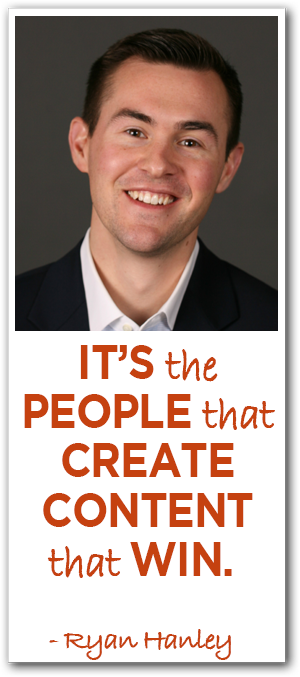 With so many brands and businesses jumping online in an effort to find their audience amongst all of the social media platforms available these days, how can you find an edge over your competition?
With so many brands and businesses jumping online in an effort to find their audience amongst all of the social media platforms available these days, how can you find an edge over your competition?